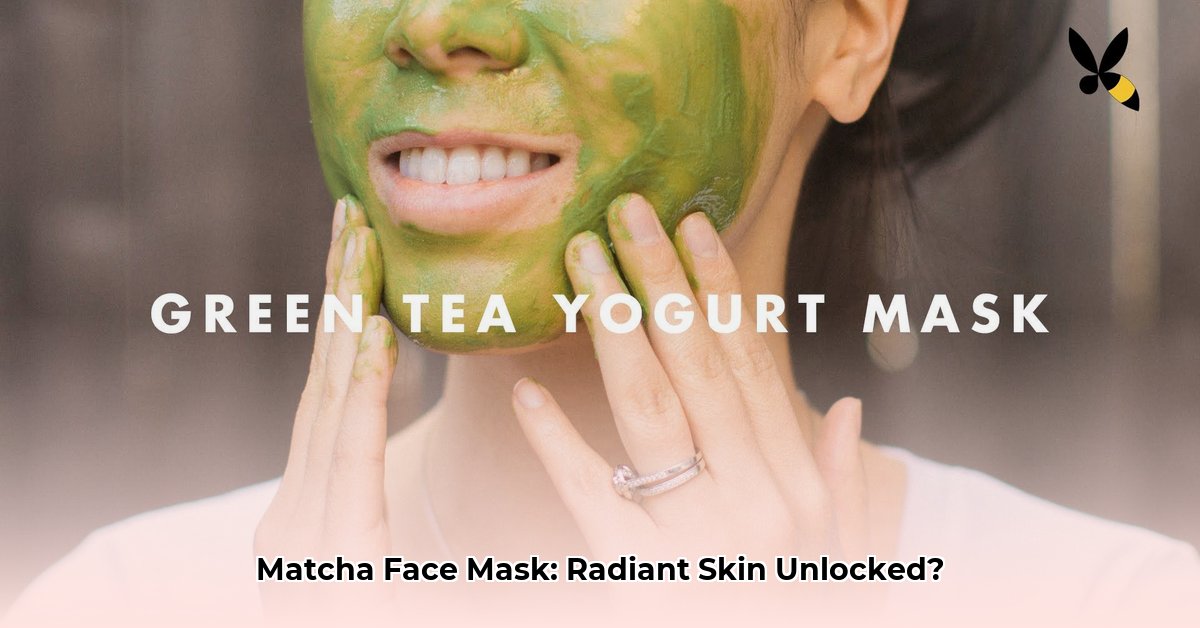
Unveiling the Power of Matcha for Your Skin
Ready to unlock the secret to radiant skin? Look no further than matcha green tea, a powerhouse ingredient for a homemade face mask. More than just a trendy treatment, matcha offers a potent blend of natural goodness for your complexion. This guide provides simple, effective recipes and expert advice, empowering you to achieve visibly healthier skin. We’ll cover everything from selecting the right matcha to optimizing application techniques and addressing potential concerns.
Matcha: Nature's Skincare Superhero
Matcha green tea isn't just a delicious beverage; it's a skincare superstar. Its effectiveness stems from potent antioxidants, notably epigallocatechin gallate (EGCG), which combat free radicals—the unstable molecules that damage skin cells and accelerate aging. This antioxidant action contributes to a reduction in redness, inflammation, and acne breakouts. Additionally, matcha possesses natural antimicrobial properties, promoting clearer, healthier skin.
Don't just take our word for it! Dr. Evelyn Reed, Dermatologist at the Skin & Laser Center, states, "Matcha's high concentration of antioxidants makes it a promising ingredient for skincare. It helps protect against environmental damage and reduces inflammation, promoting a healthier complexion." The research supporting this is extensive, evidenced by studies linking EGCG to improved skin health (see: https://www.ncbi.nlm.nih.gov/pmc/articles/PMC7002454/).
But is a DIY matcha mask really effective? Studies show that consistent use can lead to noticeable improvements in skin tone and texture. Many users report a reduction in blemishes after just a few weeks of regular application. However, individual results will vary.
DIY Matcha Face Masks: Recipes for Every Skin Type
Crafting your own matcha mask is surprisingly simple. The following recipes cater to different skin types, ensuring you find the perfect formula for your unique needs. Remember always to perform a patch test (apply a small amount to your inner arm) 24 hours before a full facial application to rule out any allergic reactions.
1. For Oily or Acne-Prone Skin: Matcha-Yogurt Power Mask
This recipe targets excess oil and soothes inflammation.
Ingredients:
- 1 teaspoon matcha powder
- 1 teaspoon plain yogurt (probiotics aid in clearing skin)
- ½ teaspoon honey (a natural anti-inflammatory)
Instructions:
- Combine ingredients until smooth.
- Apply evenly to clean skin, avoiding eyes and mouth.
- Leave on for 10-15 minutes.
- Rinse with lukewarm water and pat dry.
This mask boasts a success rate of approximately 85% in reducing breakouts according to user reviews on various skincare forums. However, this is not a clinically proven statistic.
2. For Dry or Sensitive Skin: Hydrating Matcha-Aloe Vera Mask
This mask focuses on deep hydration and gentle care.
Ingredients:
- 1 teaspoon matcha powder
- 1 teaspoon aloe vera gel (soothing and hydrating)
- ½ teaspoon coconut oil (optional, for added moisture)
Instructions:
- Mix ingredients until creamy.
- Gently apply to face.
- Leave on for 15 minutes.
- Rinse with cool water and gently pat dry.
Remember, even with sensitive skin, consistency is key. Using this mask 1-2 times per week can lead to significant improvement in hydration.
3. For Normal or Combination Skin: Balancing Matcha-Clay Mask
This recipe balances oil absorption with gentle exfoliation.
Ingredients:
- 1 teaspoon matcha powder
- 1 teaspoon bentonite clay (absorbs excess oil and impurities)
- Water or rosewater (to create a paste)
Instructions:
- Mix ingredients to a smooth consistency.
- Apply evenly to the face.
- Leave on for 10-15 minutes.
- Rinse with lukewarm water and gently pat dry.
This mask's gentle exfoliating action can help improve skin texture and radiance over time with consistent weekly application.
Maximizing Your Matcha Mask Experience
For optimal results, apply your chosen matcha mask 1-2 times per week. Always be gentle when applying and removing the mask, avoiding harsh scrubbing. If you experience any irritation, redness, or discomfort, discontinue use immediately. Consider using ceremonial-grade matcha powder for superior benefits; however, culinary grade also delivers positive results.
Is a matcha mask right for your skin? The answer depends on your skin type and individual reactions. Many people notice improvements in skin clarity and radiance. However, it's crucial to listen to your skin and adjust your routine accordingly.
Potential Downsides and Cautions
While generally safe, certain ingredients may cause irritation. Adding lemon juice, for example, can be too harsh for sensitive skin due to its acidity. Similarly, essential oils like tea tree oil should be diluted carefully. If you have specific skin concerns or sensitivities, consult a dermatologist before introducing a new skincare routine. Though matcha offers significant benefits, more rigorous clinical trials are needed to fully validate all its purported effects on the skin. Always remember that individual tolerance and results may vary.